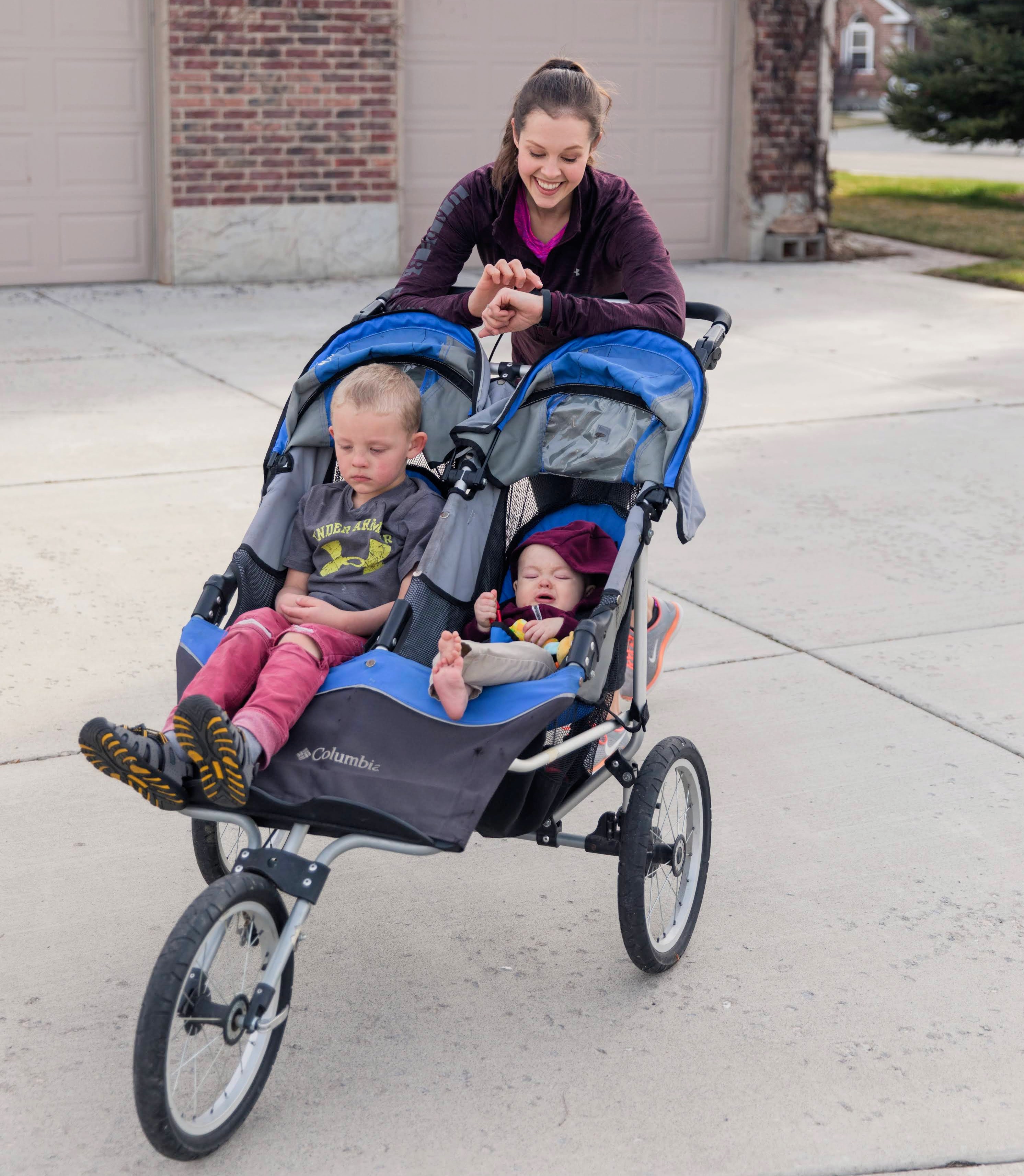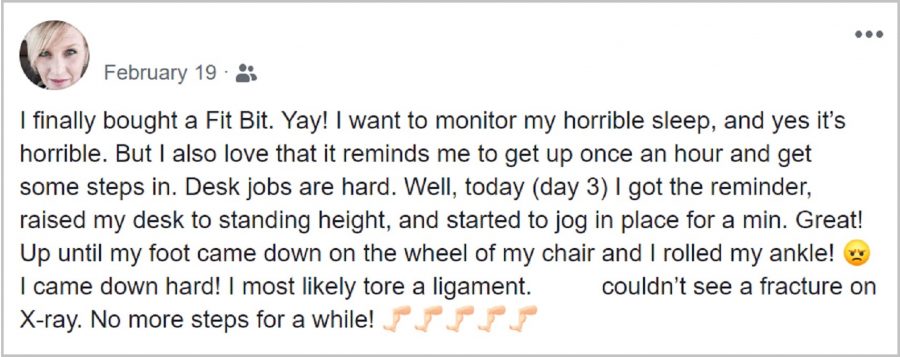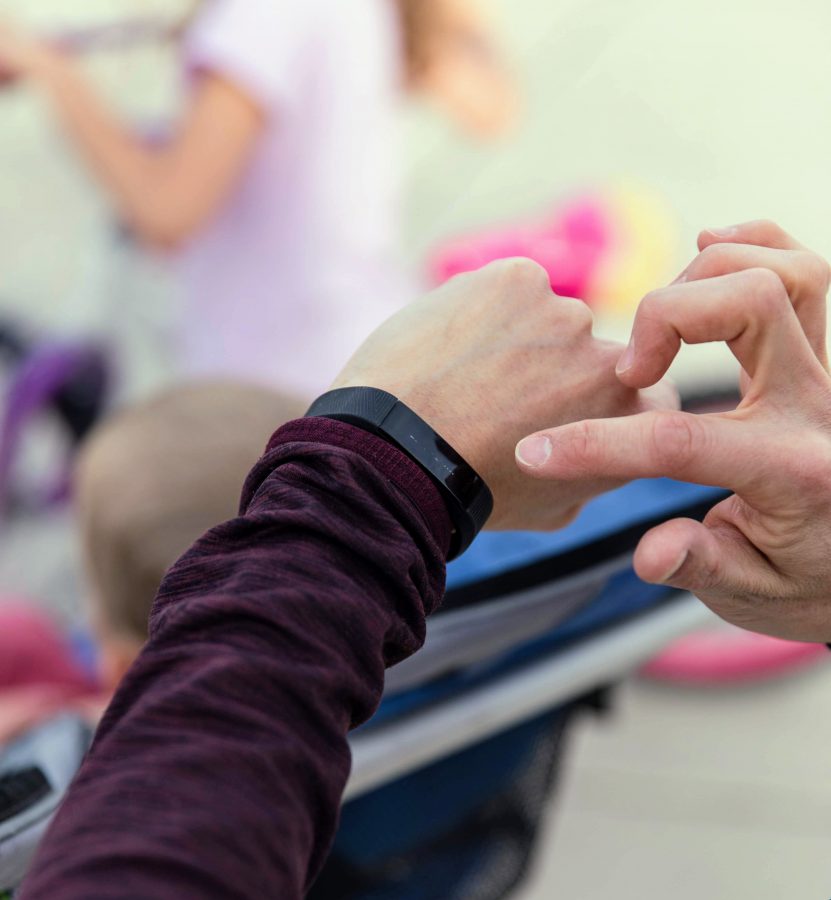Are Fitness Trackers Harmful or Helpful to Your Wellness Goals?

Which camp are you in?
About a year ago, my Fitbit One® took its last spin through the washing machine inside my jean pockets, and it never recovered. This was the second device I had done that to, and this time I decided not to replace it. I realized it was causing more harm than good for me. When I told my husband I was going to write this article, he chimed, “Well, you better tell your friends why I still like to wear mine!” He’s right. Some people really do benefit from wearing fitness trackers like the Fitbit, Garmin, VivoFit, Apple Watch, etc. Herein begins a friendly debate: Fitness trackers are harmful vs. Fitness Trackers are helpful. Which camp are you in? You can decide in a minute.
Fitness Trackers are Harmful
1. Feeds perfectionism and accomplishment addiction.
Two years ago, I was diagnosed with anxiety and depression related to perfectionism and accomplishment addiction. My Fitbit® was feeding those issues and making the problem worse. On the days when I accomplished my goal for steps and stairs taken, I would feel fit and positive about myself. However, on the days when I did not reach my goal, I would beat myself up and entertain negative self-talk.
2. Injury from overworking in an unnatural way.
To accomplish my steps goals, I would find myself moving in unnatural ways. While folding laundry, I always marched in place, barefoot on my tiled floor. Not only did it take twice as long to fold the laundry, but I developed plantar fasciitis from overworking my lower legs without proper footgear. (Insert forehead slap here.)
My friend gave me her permission to share a similar story:

3. Encourages steps more than full body exercises.
We need variety in exercise in order to reduce risk of injury and care for our whole body. As a busy Mom chasing toddlers and tweens, I need weight training just as much as walks and jogs. Using a Fitbit® encouraged me to run/walk instead of circuit training, because when steps are all that matter, lifting weights doesn’t count as much. My Fitbit® was teaching me to ignore my body’s natural cues for the type of movement I actually needed.
“While wearing a FitBit may feel motivating for some, for others it can become a barrier to respecting what their body is communicating to them. Someone prone to obsession with food and body image can easily feel triggered by numbers for tracking exercise or calories. Wearing a FitBit can be a slippery slope into disordered eating and excessive exercise, so wearing one should be used with caution.”
Emily Fonnesbeck, Registered Dietitian Nutrition Therapist

Fitness Trackers are Helpful
1. Motivating data-driven people
My husband is a data analyst. He lives and breathes data like I live and breathe peanut butter and dark chocolate! Each morning he weighs himself on the scale and each night he checks his steps for the day. As he tracks those numbers he determines his physical productivity for the day. When his steps for the day are low, he is motivated to get up the next morning and make sure he increases that number in the next 24 hours. When his step count is high, it is motivating for him to keep the trend going.
2. Reminders for people with desk jobs
In his tech-based work, my husband has a sedentary job, sitting at a desk. It’s innovative and exciting work for him, so he could easily work a 10-hour day and never take a break to eat or get up and move. He depends on his Fitbit® alerts to remind him to take a walk around the office. In turn, this ends up clearing his mind as his blood gets pumping for a moment, and it helps him perform even better at work.
3. Tool for fitness competitions
Like most men, my husband is competitive. Whether it’s a game of Yatzee or a church basketball tournament, my husband takes games seriously. His favorite quote is from the 2006 film Nacho Libre, (cue bad stache and stretchy pants) “I want to wiiin!” Competitions are motivating, and once he puts his mind to accept a challenge, he can’t be stopped. Fitness challenges at work or against his brothers are the top incentives for him to exercise consistently. During fitness competitions he sleeps better, eats better, and uses his overall time better. Fitness challenges involve data from his fitness tracker to determine whether goals were met and which tier of prizes he qualifies for. When a season pass for a nearby ski resort is on the line, he will go to great lengths to get as many steps in the day as possible for a chance to wiiin!
Just as with anything health or wellness related, we have to look at this from an individual-based perspective. That balance of helpful vs. harmful is going to look very different for every person. For someone who is training for something specific – a race of some sort – a fitness tracker is extremely helpful and useful for tracking mileage. I used my watch every time I went out running as I trained for my last half marathon to gauge my distance. Some would say they find a fitness device largely increases their steps each day or basic activity and is helping them improve their health. But just like anything in the health and wellness realm, something that’s “helpful” can easily become something “harmful” if we become obsessive about it or let it rule our intuition.
Meg Miles, momstrongutah.com
What Science Says about Fitness Trackers
All personal opinions aside, what does evidence-based science say about the usefulness of wearing fitness tracking devices?
- In a randomized clinical trial, wearing technology for tracking physical activity was less effective for weight loss than standard intervention (low-calorie diet, exercise requirements, group meetings and counseling). Those studied actually lost less weight wearing a fitness tracker than those who did not wear one.
- When it comes to weight loss programs, although the science is showing that more weight is lost with standard intervention, a significant amount of weight is also lost when replacing group meetings and calorie monitoring with the use of a fitness tracker. The advantage of using a fitness tracker in weight loss programs is that it costs much less money in this self-help method rather than in-person monitoring.
- There also seems to be a significant amount of variance in the accuracy of different models of fitness trackers. The FitBit One®, worn on the hip, is more accurate at measuring steps and calories burned than the FitBit Zip®, worn on the wrist. The accuracy of steps for trackers worn on the hip was within 1 step of 100% accuracy. Those worn on the wrist were off by 11 steps per minute. When measuring calories burned, trackers on the hip underestimated by 6% and those worn on the wrist OVERestimated by 21%. Read the full author manuscript here. One thing that’s certain is it’s important to make sure you do your homework before deciding which model to purchase.
So, which camp are you in? Are fitness trackers harmful or helpful for you? Do you move your body for the pure enjoyment of it? Or do you prefer to receive credit for each of the steps you take throughout the day? There’s no right or wrong answer. Let’s continue this friendly debate in the comments below. I would love to hear your thoughts!
Until next time,

Since 2009, Megan has used her Bachelor’s Degree in Dietetics from Brigham Young University to help people develop healthy food relationships. She combines evidence-based science, a dash of alternative medicine, and a large dose of practical food preparation to teach individuals how to feed themselves and their families nourishing meals with common ingredients. As a busy Mom of 5, she believes food should be simple, intentional, and HEARTY!


